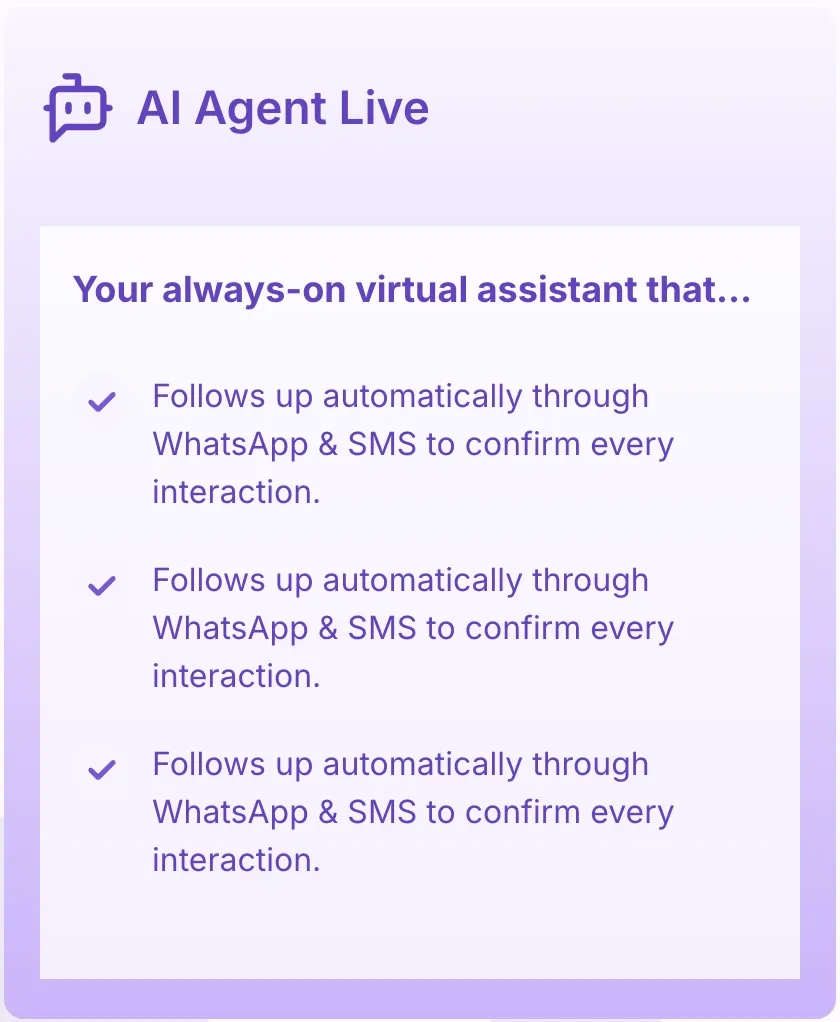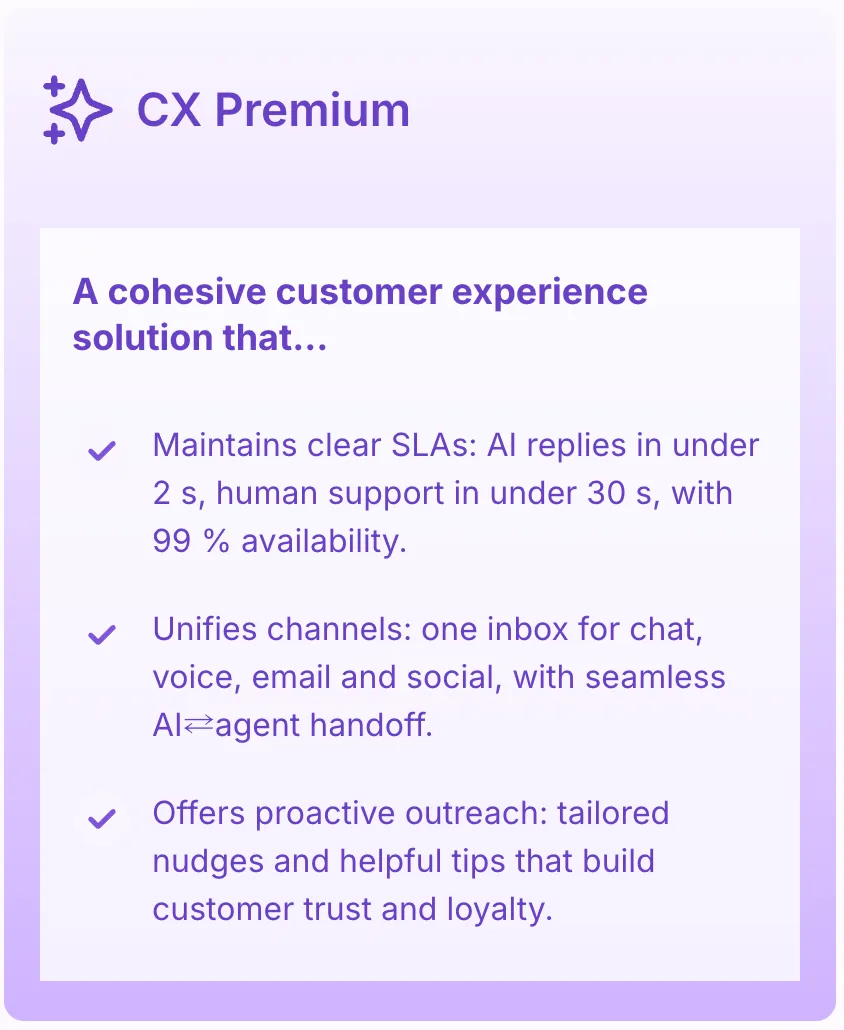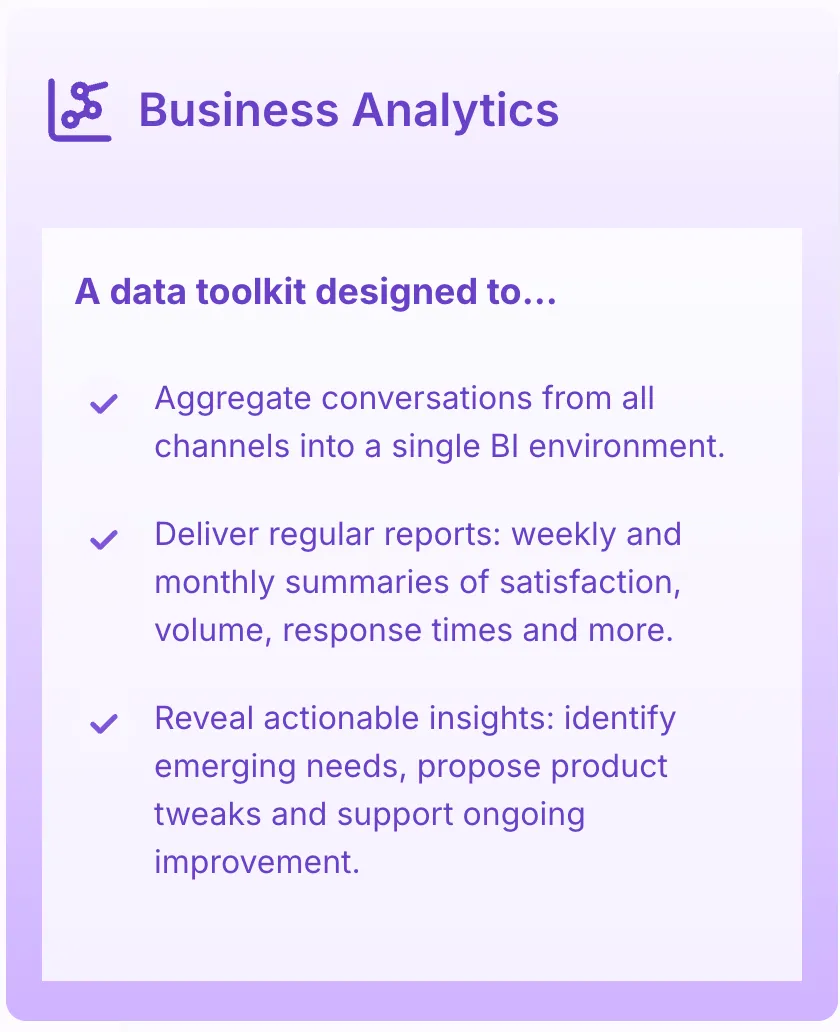Think of AI agents as your business's digital workforce, capable of:
- Understanding complex customer queries
- Learning from each interaction
- Making independent decisions
- Scaling operations effortlessly
- Providing personalized support 24/7
The impact of AI agents on modern businesses is transformative. Companies implementing these solutions report up to 60% reduction in operational costs, 50% increase in agent productivity, and 80% decrease in training expenses.
This article explores the unexpected ways AI agents are changing customer service. You'll learn how these intelligent systems are not only meeting customer expectations but also surpassing them, setting new standards for service excellence, and driving business growth through improved customer experiences.
The Evolution of AI Agents
AI agents have transformed dramatically from simple rule-based chatbots to sophisticated autonomous systems. The journey began with basic automated response systems in the 1960s, leading to today's advanced AI-powered solutions capable of understanding context, intent, and delivering personalized experiences.
Modern AI agents come in four distinct categories, each serving specific customer service functions:
1. Front-line AI Agents
- Handle high-volume routine inquiries
- Provide instant responses to common questions
- Filter and prioritize customer requests
2. Resolution AI Agents
- Manage end-to-end problem solving
- Execute complex multi-step processes
- Make autonomous decisions based on customer needs
3. Proactive Support AI Agents
- Identify potential issues before they escalate
- Send preventive notifications to customers
- Monitor system health and user behavior patterns
4. Knowledge Retrieval AI Agents
- Access vast databases instantly
- Deliver accurate, consistent information
- Update responses based on new data
These AI agents now incorporate advanced technologies like natural language processing, machine learning, and neural networks. They learn continuously from each interaction, refining their responses and decision-making capabilities. The integration of these technologies enables AI agents to process multiple data points simultaneously, making nuanced decisions based on complex criteria.
Recent developments have introduced self-learning capabilities, allowing AI agents to evolve through interactions, analyze outcomes, and adapt to new scenarios automatically. This advancement marks a significant shift from static programmed responses to dynamic, context-aware solutions.

Key Features That Make AI Agents Stand Out
AI agents have unique abilities that make them different from traditional customer service solutions. These advanced systems use complex technologies to provide outstanding support experiences.
1. Autonomous Decision-Making
AI agents can handle customer inquiries on their own, without needing human involvement. Here's how:
- They process customer inquiries in real-time, without any delays.
- They use historical data patterns to smartly route complex cases to the right team or agent.
- They automatically prioritize urgent customer needs, ensuring that critical issues are addressed promptly.
- They have self-learning mechanisms in place to continuously improve response accuracy based on feedback and past interactions.
- They can solve problems independently by following predefined parameters and guidelines.
2. Context Understanding
AI agents are skilled at understanding the context of customer interactions. This helps them provide more relevant and personalized support. Here are some ways they achieve this:
- They can recognize customer sentiment and emotional states through natural language processing techniques.
- They have access to the complete customer history, including previous interactions and transactions.
- They understand cultural nuances and preferences, allowing them to tailor their responses accordingly.
- They can interpret multiple questions within single requests, saving time for customers who may have complex queries.
- They dynamically adapt their responses based on the flow of conversation, making the interaction feel more natural.
3. Neural Network Enhancement
The use of neural networks enhances the decision-making capabilities of AI agents. This enables them to process large amounts of data and make accurate predictions. Here's how it works:
- Neural networks allow AI agents to process thousands of data points simultaneously, identifying patterns and trends.
- They can recognize specific behaviors or preferences across vast customer databases, helping in targeted marketing efforts.
- Predictive analysis powered by neural networks enables proactive problem resolution before customers even reach out for assistance.
- AI agents learn from successful interaction outcomes, refining their strategies over time.
- Real-time optimization of response strategies ensures that AI agents are always improving based on feedback.
These advanced features enable AI agents to handle complex customer service scenarios with remarkable precision. The combination of autonomous decision-making, contextual understanding, and neural network capabilities creates a powerful system that adapts and improves with each interaction.
AI agents analyze customer behavior patterns to anticipate needs and customize responses accordingly. This level of personalization extends beyond simple query resolution - it creates meaningful, relevant interactions that resonate with customers on an individual level.
The sophisticated architecture behind AI agents allows them to process multiple variables simultaneously, considering factors like customer history, current context, and business rules to generate appropriate responses. This multi-dimensional approach ensures consistent, high-quality support across all customer touchpoints.
Benefits Businesses Gain by Leveraging AI Agents for Customer Service
AI agents deliver substantial value to businesses through three key advantages: lightning-fast response times, uninterrupted support availability, and significant cost reductions.
1. Dramatically Reduced Response Times
- Instant responses to customer inquiries within seconds
- Simultaneous handling of multiple customer conversations
- Real-time processing of customer requests across different channels
- 50% reduction in average resolution time compared to traditional support methods
2. 24/7 Support Availability
- Round-the-clock customer service without human agent limitations
- Consistent service quality during peak hours and off-hours
- Immediate assistance during holidays and weekends
- Support across different time zones without additional staffing
3. Cost-Effective Scaling
- 60% reduction in operational costs through automated responses
- 80% decrease in training expenses
- Elimination of costs associated with hiring additional support staff
- Efficient handling of high-volume requests without proportional cost increases
The implementation of AI agents transforms customer service operations through measurable improvements:
- 90% automation achieved within 30 days of deployment
- 50% increase in agent productivity
- Handling of 35+ communication channels simultaneously
- Reduced customer wait times from hours to seconds
These benefits create a powerful ripple effect across organizations. Companies report higher customer satisfaction scores, improved employee retention rates, and stronger brand loyalty. The ability to scale support operations without proportional cost increases enables businesses to grow their customer base while maintaining service excellence.
AI agents' predictive capabilities help businesses anticipate and address customer needs before they become issues. This proactive approach reduces support tickets and enhances the customer experience through personalized interactions based on historical data and behavior patterns.
The combination of speed, availability, and cost efficiency positions AI agents as a strategic asset for businesses aiming to deliver exceptional customer service while optimizing operational resources.

Enhancing Customer Service Efficiency with Advanced Capabilities of AI Agents
AI agents break down language barriers through sophisticated multilingual support capabilities. These systems can communicate fluently in 35+ languages, enabling businesses to serve diverse global markets without maintaining separate support teams for each region. The AI's natural language processing allows it to understand cultural nuances and local expressions, delivering culturally appropriate responses that resonate with customers worldwide.
Key Multilingual Features:
- Real-time language detection
- Automatic translation and response generation
- Region-specific idiom understanding
- Cultural context adaptation
The omnichannel capabilities of AI agents create a unified customer experience across multiple platforms. Your customers can start a conversation on WhatsApp, continue through email, and complete it on your website - the AI maintains context throughout the journey.
Omnichannel Integration Points:
- Social media platforms
- Messaging apps
- Email systems
- Live chat interfaces
- Voice channels
- Mobile apps
AI agents track customer interactions across these channels, maintaining a single conversation thread. This seamless integration eliminates the frustration of repeating information, as the AI remembers previous interactions regardless of the communication method.
The system's ability to handle complex workflows across channels enables:
- Instant access to customer history
- Consistent brand voice across platforms
- Synchronized updates across all touchpoints
- Smart routing between channels based on query complexity
These advanced capabilities allow businesses to scale their customer service operations globally while maintaining personalized, context-aware support across all communication channels.
Ensuring Security, Compliance, and Seamless Integration When Adopting Enterprise-Grade AI Solutions
Enterprise-grade AI solutions demand robust security measures and strict compliance adherence to protect sensitive customer data. The implementation of AI agents requires specific security certifications and compliance standards:
Essential Security Certifications
- HIPAA Certification: Safeguards protected health information (PHI) in healthcare settings
- SOC2 Certification: Validates security controls, data privacy, and processing integrity
- ISO Standards: Ensures consistent security practices across global operations
GDPR Compliance Requirements
- Data minimization principles
- Clear consent mechanisms
- Right to data erasure
- Transparent data processing documentation
- Regular security audits
AI agents must incorporate built-in security features to maintain data protection:
- Encryption protocols for data in transit and at rest
- Access control mechanisms with role-based permissions
- Audit trails tracking all system interactions
- Data residency compliance for regional requirements
- Regular vulnerability assessments and penetration testing
Integration Considerations
- API security protocols
- Authentication mechanisms
- Data flow monitoring
- System compatibility checks
- Backup and recovery procedures
Organizations must establish clear security policies and procedures for AI agent deployment:
- Regular security training for staff
- Incident response planning
- Data breach notification protocols
- Compliance monitoring systems
- Documentation of security measures
These security measures protect both business interests and customer trust while enabling AI agents to operate effectively within regulatory frameworks.

Measuring ROI and Business Impact After Implementing Cutting-Edge Technology Like An Advanced Ai Agent Solution
The implementation of AI agents delivers substantial returns across multiple business metrics. Companies leveraging AI agent technology report significant improvements in operational efficiency and customer satisfaction scores.
Key Performance Metrics:
Cost Reduction
- 60% decrease in operational costs
- 80% reduction in training expenses
- 50% increase in agent productivity
Customer Service Enhancement
- 90% automation achievement within 30 days
- 35+ channels supported without proportional cost increases
- 2 hours daily time savings for service teams
Real-World Impact Data:
According to recent studies:
- HubSpot reports service teams recover 2 hours daily using AI for customer communications
- Zendesk reveals 66% of CX organizations experience improved warmth and familiarity in customer service
- Salesforce data shows 33% of customers prefer AI agents to avoid repetitive interactions
Integration Benefits:
AI agents with CRM integration capabilities demonstrate:
- Streamlined ticket routing
- Enhanced context retention across channels
- Improved first-contact resolution rates
- Data-driven insights for strategic decision-making
Companies implementing AI agents track 20+ key metrics for performance optimization. The technology's ability to maintain cross-channel continuity while adapting to customer needs creates measurable value through:
- Predictive insights generation
- Automated routine task handling
- Real-time coaching capabilities
- Knowledge base accessibility
- Smart routing mechanisms
These capabilities translate into tangible business outcomes, with organizations reporting higher customer satisfaction scores and improved operational efficiency across their service departments.
Conclusion
AI agents have transformed customer service, setting a new standard for how businesses interact with their customers. These intelligent systems provide personalized and efficient support while also saving costs and improving operations.
The future of AI agents in customer service looks bright:
- Advanced Personalization: AI agents will gain a deeper understanding of customer preferences, emotions, and behaviors.
- Seamless Integration: Better connectivity with business systems will create a unified experience for customers.
- Predictive Support: AI agents will be able to anticipate customer needs before any issues arise.
- Human-AI Collaboration: Improved teamwork between AI and human agents will enhance the quality of service.
It's clear that AI agents are more than just tools; they are strategic assets that are reshaping customer service. As these technologies continue to develop, businesses that embrace AI agents will be at the forefront of innovation in customer experience, ready to meet the demands of tomorrow's service industry with confidence and capability.
FAQs (Frequently Asked Questions)
What are AI agents and why are they significant in modern customer service ?
AI agents are advanced software programs designed to autonomously interact with customers, providing efficient and personalized support. They have become a game-changer in modern businesses by enhancing customer experience, reducing response times, and enabling 24/7 service availability.
What types of AI agents are commonly used in customer service ?
There are several types of AI agents including front-line AI agents that handle initial customer interactions, resolution AI agents focused on solving specific issues, proactive support AI agents that anticipate customer needs, and knowledge retrieval AI agents that provide relevant information quickly.
How do AI agents make autonomous decisions to improve customer support ?
AI agents utilize neural network decision-making processes combined with context understanding to analyze customer interactions. This enables them to make autonomous decisions that deliver personalized and relevant responses, thereby improving the efficiency and quality of customer support.
What are the key benefits businesses gain by leveraging AI agents for customer service ?
Businesses benefit from improved response times, round-the-clock 24/7 support, personalized interactions tailored to individual customers, and significant cost reductions through automation and scalability provided by AI agent technologies.
How do AI agents enhance customer service efficiency across multiple languages and channels ?
AI agents offer multilingual support allowing businesses to cater to diverse markets effectively. Additionally, their omnichannel capabilities ensure seamless customer experiences across various communication platforms such as chat, email, and social media.
What security and compliance measures should businesses consider when adopting enterprise-grade AI solutions ?
It is crucial for businesses to ensure their AI solutions meet standards like HIPAA certification for healthcare data protection, SOC2 certification for security controls, and GDPR compliance to safeguard customer data privacy when implementing AI agents in their customer service frameworks.












